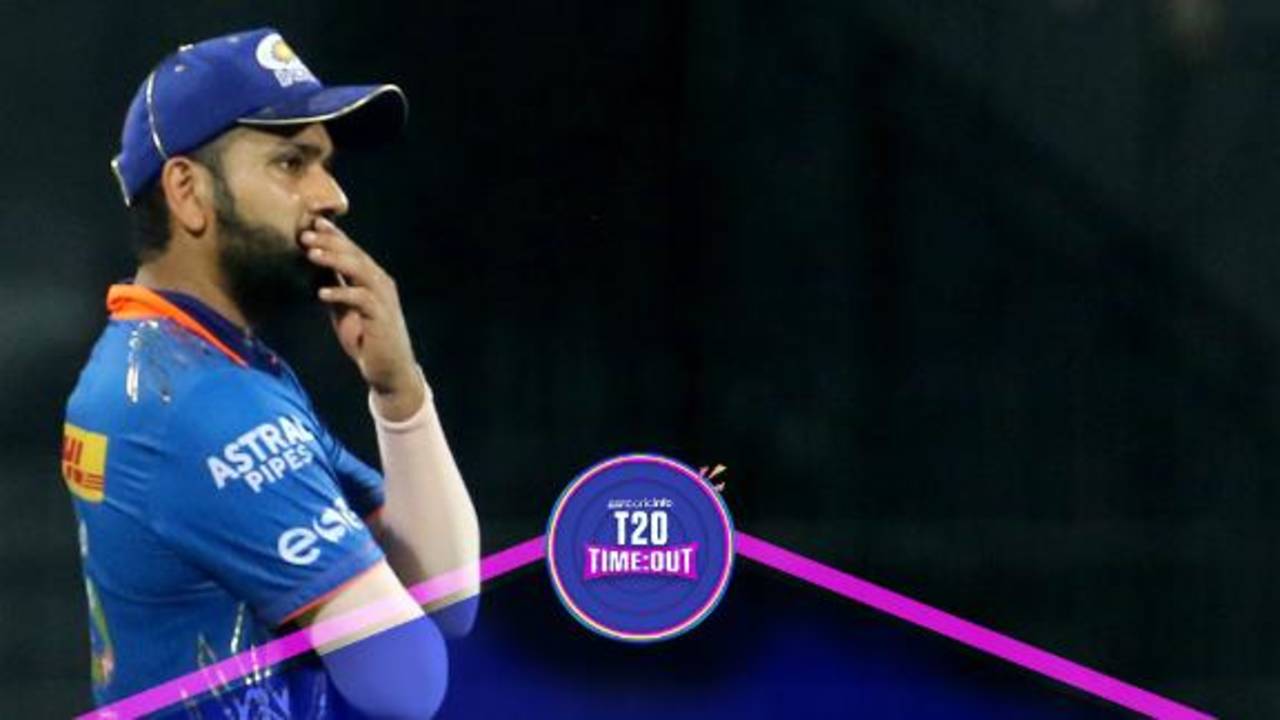How sluggish Chepauk pitches led to Mumbai Indians' death-overs slump
Despite the presence of Pollard and the Pandya brothers in their middle order, Mumbai manage only 26 in last four overs against Kings
Nagraj Gollapudi
23-Apr-2021
13.61 - Defending champions Mumbai Indians' run rate in the death overs in IPL 2020, the highest by any team in IPL history.
7.48 - Mumbai's run rate at the death so far in IPL 2021, their lowest ever in the tournament's history.
The difference in those two numbers encapsulates the story of Mumbai's batting struggles which have been responsible for them managing to win just two of their first five matches this season.
Mumbai's choke in the death overs can further be illustrated by the following numbers: 26 runs in the last four overs against the Punjab Kings on Friday, 23 against the Delhi Capitals in their previous game and 24 against the Royal Challengers Bangalore in the tournament opener.
Bizzare? Yes, how can Mumbai, who despite possessing some of the biggest power-hitters in Kieron Pollard and Hardik Pandya stutter and come to a standstill like some old croaking automobile from the 20th century?
Mainly because of the slow nature of the Chennai pitch, where the ball has gripped the surface and turned. However, Mumbai's middle order is not the only one this IPL to have struggled on sluggish Chepauk surfaces. In fact, only the Royal Challengers, led by the incomparable pair of Glenn Maxwell and AB de Villiers, have been successful.
Mumbai thought they also had batters of similar capability in Pollard and the Pandya brothers, men who have shown in the past that no ground can be too big, no situation too difficult. But these batters normally prefer to hit through the line with the ball coming on to the bat, as it does at their home base of the Wankhede Stadium.

ESPNcricinfo Ltd
Not surprisingly then the opposition bowling attacks have varied their pace, bowling a healthy percentage of slower balls and cutters banged on hard lengths. Against Hardik especially, bowlers have cut down on pace and challenged his ego. The Mumbai batter has fallen more than once for the bait, going for the big hits straightaway and ending up paying the price with his wickets. His highest score in this IPL has been 15 in five innings.
The failure of the Pandya brothers, including Krunal, who has failed to play to the situation, has added pressure on Pollard, who usually can be dangerous when there is a good partnership going. While Sharma had shrugged off the batting failure after losing the tournament opener against the Royals Challengers, on Friday he conceded that Mumbai top order had to change their batting approach and strategy.
Cue the over-cautious approach on Friday in the powerplay, where Mumbai managed just 21 runs, their joint-second lowest in the IPL. Mumbai also tweaked their batting order with Suryakumar Yadav moving to No. 4, a move dictated to counter the spinners in the middle overs. Eventually, it was the 79-run partnership between Sharma and Yadav that proved to be the backbone of the Mumbai innings, as the lower middle order faltered once again.
"Not enough runs [to defend], exactly," Sharma agreed with the post-match presentation host Danny Morrison's query. "I still feel it's not a bad wicket to bat on. You clearly saw from Kings how they batted - they won the game with nine wickets in hand."
Sharma was in no mood to hide Mumbai's weakness. "It's just the application that is missing from our batting. If you get 150, 160 on this kind of wicket, you are always in the game. That is something we failed to do in the last two games and that is something we need to look that. It is something that is missing in our batting line-up. We are not able to bat 20 overs in the fashion that we want to. We are missing a little, little overs where we could capitalise."
According to Sharma, the pitch was "challenging" but instead of focusing on the situation, his players let it overwhelm them. "We are not putting enough effort on the field. It is just that we need to understand when the conditions are tough, you need to put the head down and understand how you need to bat and how you need to bowl."
Another factor that might have impacted Mumbai was the unfamiliarity with the conditions. Since 2016 and before the start of this season, Mumbai had played just two matches at Chepauk.
Friday's was Mumbai's last match in Chennai. While they will say good riddance, that may not be the end of their batting woes as their next destination, the Arun Jaitley Stadium in Delhi, is also known to have thrown up slow pitches in the recent past.
Nagraj Gollapudi is news editor at ESPNcricinfo
